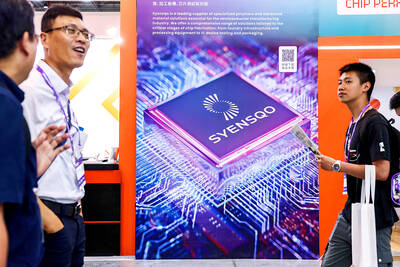Preorders of HTC Corp’s (宏達電) mid-range Desire 12+ opened yesterday, with the smartphone maker hoping the new model will drive its revenue higher this year.
Consumers can preorder the Desire 12+ for NT$7,490 (US$250) at HTC stores nationwide, as well as its online platform, the company said.
From Friday next week, the new model is to be available at the nation’s five telecoms: Chunghwa Telecom Co (中華電信), Far EasTone Telecommunications Co (遠傳電信), Taiwan Mobile Co (台灣大哥大), Taiwan Star Telecom Co (台灣之星) and Asia Pacific Telecom Co (亞太電信), HTC said.
The Desire 12+ is equipped with a 6-inch edge-to-edge display with an aspect ratio of 18:9, making it the largest display in the Desire series, the company said.
The smartphone is powered by a Qualcomm Inc Snapdragon 450 processor and equipped with 3 gigabytes (GB) of RAM and 32GB of internal storage, as well as a 2,965 milliampere-hour battery, HTC said.
The new model is the first in the Desire series to boast a dual-lens camera — a 13-megapixel lens paired with a 2-megapixel lens on the back for depth effect.
FULL MODEL RANGE
Earlier this month, HTC announced that its flagship U12+ would go on sale today, but no pricing information was immediately available.
The company plans to launch low, mid and high-end models to target as many consumers in Taiwan as possible and is looking to become the third-largest brand in the nation by the end of next month, up from fourth last year, HTC general manager and senior marketing officer Darren Chen (陳柏諭) said.
Faced with escalating competition in the global smartphone market, HTC last month posted consolidated sales of NT$2.1 billion, down 24.18 percent from a month earlier and 55.47 percent from a year earlier.
Last month’s figure was HTC’s lowest monthly sales since August 2004, when its revenue totaled NT$2.05 billion.
HTC posted first-quarter net profit of NT$21.1 billion, compared with a net loss of NT$9.8 billion a quarter earlier. Earnings per share were NT$25.70.
The first-quarter results, which ended 11 consecutive quarters of losses, were boosted by a sale of its research and development team that worked on the Pixel smartphone and a nonexclusive license for intellectual property to Google for US$1.1 billion in cash last year.

SEMICONDUCTOR SERVICES: A company executive said that Taiwanese firms must think about how to participate in global supply chains and lift their competitiveness Taiwan Semiconductor Manufacturing Co (TSMC, 台積電) yesterday said it expects to launch its first multifunctional service center in Pingtung County in the middle of 2027, in a bid to foster a resilient high-tech facility construction ecosystem. TSMC broached the idea of creating a center two or three years ago when it started building new manufacturing capacity in the US and Japan, the company said. The center, dubbed an “ecosystem park,” would assist local manufacturing facility construction partners to upgrade their capabilities and secure more deals from other global chipmakers such as Intel Corp, Micron Technology Inc and Infineon Technologies AG, TSMC said. It

EXPORT GROWTH: The AI boom has shortened chip cycles to just one year, putting pressure on chipmakers to accelerate development and expand packaging capacity Developing a localized supply chain for advanced packaging equipment is critical for keeping pace with customers’ increasingly shrinking time-to-market cycles for new artificial intelligence (AI) chips, Taiwan Semiconductor Manufacturing Co (TSMC, 台積電) said yesterday. Spurred on by the AI revolution, customers are accelerating product upgrades to nearly every year, compared with the two to three-year development cadence in the past, TSMC vice president of advanced packaging technology and service Jun He (何軍) said at a 3D IC Global Summit organized by SEMI in Taipei. These shortened cycles put heavy pressure on chipmakers, as the entire process — from chip design to mass

People walk past advertising for a Syensqo chip at the Semicon Taiwan exhibition in Taipei yesterday.

NO BREAKTHROUGH? More substantial ‘deliverables,’ such as tariff reductions, would likely be saved for a meeting between Trump and Xi later this year, a trade expert said China launched two probes targeting the US semiconductor sector on Saturday ahead of talks between the two nations in Spain this week on trade, national security and the ownership of social media platform TikTok. China’s Ministry of Commerce announced an anti-dumping investigation into certain analog integrated circuits (ICs) imported from the US. The investigation is to target some commodity interface ICs and gate driver ICs, which are commonly made by US companies such as Texas Instruments Inc and ON Semiconductor Corp. The ministry also announced an anti-discrimination probe into US measures against China’s chip sector. US measures such as export curbs and tariffs